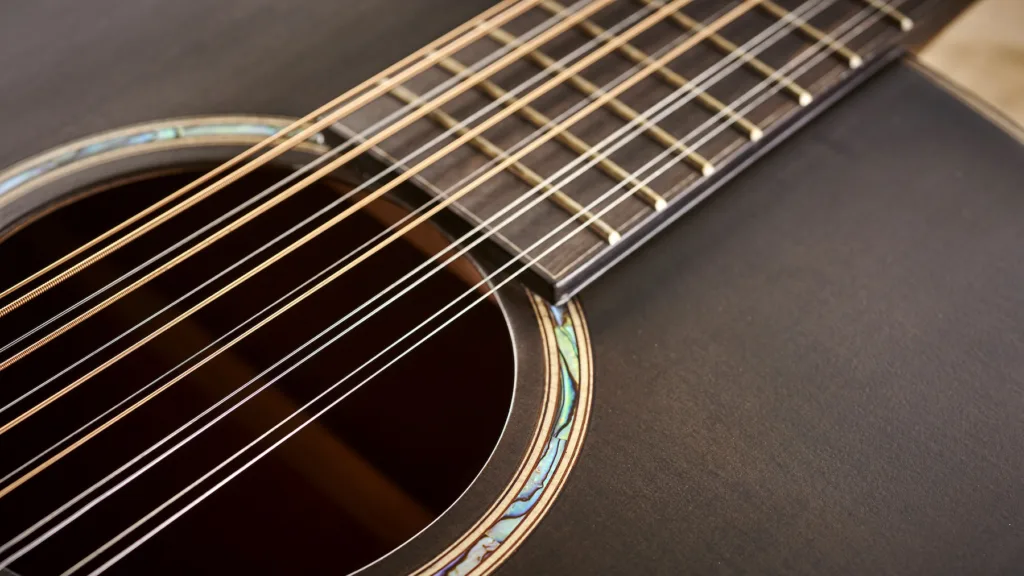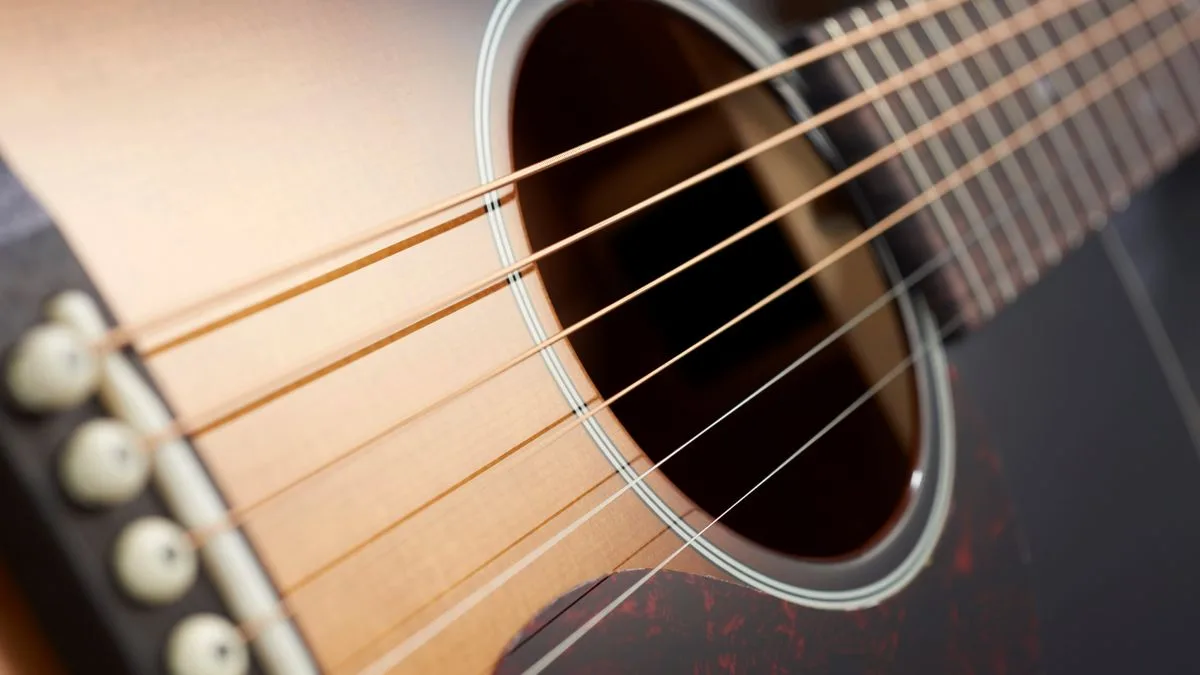Ready to take your acoustic guitar playing to the next level? It all starts with finding the perfect strings for your instrument. But with so many options out there, it can be overwhelming trying to figure out which ones are best for you. That’s why I’m here to help!
In this article, we’ll delve into the world of acoustic guitar strings and explore what makes them different from each other. We’ll cover everything from materials used, gauges, coatings, and more. By the end, you’ll have a better understanding of what sets certain strings apart and be able to make a confident decision in choosing the best ones for your unique sound. So let’s get ready to unlock the secret behind great sound- starting with finding the right acoustic guitar strings!
So, what are the best acoustic guitar strings?
The best acoustic guitar strings are a highly debated topic among musicians, as everyone has their own personal preference. However, there are some key factors to consider when choosing the right strings for your instrument.
First and foremost, it is important to understand that different types of strings produce different sounds. The material used in the string can greatly affect the tone and overall sound of your guitar. Some popular options include bronze, phosphor bronze, nickel-plated steel, and silk and steel.
Bronze strings tend to have a bright and crisp sound with good sustain, making them ideal for genres such as folk or country music. Phosphor bronze strings have a warmer tone compared to regular bronze strings due to their higher copper content. This makes them well-suited for playing blues or fingerstyle music.
Nickel-plated steel strings offer a balanced sound with a bit more warmth than traditional steel strings. They are often preferred by electric guitar players who want to achieve an acoustic-like tone on their instrument.
Silk and steel strings have a softer feel under the fingers and produce a mellow sound perfect for classical or jazz music.
Besides material, another factor to consider is string gauge – essentially how thick or thin the individual strings are. Thicker gauges tend to provide more volume and sustain but can be harder on the fingers while thinner gauges may be easier on beginners but sacrifice some depth of sound.
Ultimately, finding the best acoustic guitar string will come down to personal preference based on your playing style and desired sound. Experimenting with different materials and gauges can help you find the perfect match for your instrument.
Understanding the Role of Materials in Acoustic Guitar Strings
When it comes to acoustic guitar strings, the materials used play a huge role in shaping the sound and feel of the instrument. Different materials can create a wide range of tones, from bright and sharp to warm and mellow. For example, strings made of phosphor bronze are known for their rich, rounded sounds that resonate deeply, making them perfect for genres like folk or jazz. In contrast, 80/20 bronze strings have a brighter tone with more metallic overtones; they often make your guitar’s voice cut through mixes beautifully in country or bluegrass settings.
But it’s not just about how they sound; these materials also affect how they feel under your fingers. Some players prefer nickel-plated steel strings because they’re smoother and easier on the fingertips during long practice sessions. Others might lean towards coated strings made with modern polymers which extend their life by protecting against corrosion without sacrificing much in terms of tonal quality. Here’s where it gets interesting:
- Phosphor Bronze: Warmth and resonance.
- 80/20 Bronze: Brightness and clarity.
- Nickel-Plated Steel: Smoothness for playability.
- Coated Strings: Longevity with minimal tonal loss.
So next time you pick up an acoustic guitar, take note of what those strings are made from—they’re doing more than you think! Choosing wisely could transform your playing experience entirely.
Exploring Different Guitar Gauges and Their Impact on Sound Quality
When it comes to choosing guitar strings, the gauge—or thickness—of those strings plays a crucial role in shaping your sound. Lighter gauges, like .009 or .010, are thinner and easier on the fingers, making them perfect for bending notes and playing swift solos. These lighter strings produce a brighter tone but can lack sustain and depth. You’ll find that genres such as rock, pop, or country often favor these lighter gauges because of their effortless playability.
On the flip side, heavier gauges like .011 or .012 offer more resistance under your fingers but reward you with a richer tone full of warmth and resonance. These thicker strings are great for rhythm guitar parts where sustain and fullness matter most. They’re often used in jazz or blues genres where every note needs to carry weight. However, if you’re new to guitar playing or have concerns about finger strength, starting with lighter gauges might be wiser until you build up some callouses.
- Lighter Gauges: Easier to bend; bright tone; less sustain.
- Heavier Gauges: Harder to press; rich tone; more sustain.
Ultimately, experimenting with different string gauges will help you discover what suits your style best.
It’s all about finding that sweet spot between playability and sound quality that makes the music come alive for both player and listener alike.
Read also: Is learning to play guitar worth it?

Insights into Coated vs. Uncoated Guitar Strings: Which are Better?
Guitar strings may seem like a minor detail, but they can profoundly impact your playing experience. Coated strings come with a thin layer of polymer that shields them from the elements. This protective coat helps to ward off grime, sweat, and general wear and tear. As a result, these strings tend to last significantly longer than their uncoated counterparts. The trade-off? Some musicians feel that coated strings lack the raw vibrancy and brightness typically associated with traditional strings.
On the other hand, uncoated guitar strings offer an undeniably authentic sound that’s rich in overtones and harmonics. They deliver a direct connection between your fingers and the music, providing more immediate feedback as you play. However, they are also more susceptible to rusting and losing their tone faster due to exposure to oils from your hands and environmental factors.
- Lifespan: Coated lasts longer.
- Tone: Uncoated is often preferred for its bright sound.
Ultimately, choosing between coated vs uncoated comes down to personal preference—and what kind of playing environment you’re dealing with day-to-day. Are you gigging frequently or just strumming at home? Each type has its virtues; understanding these nuances can help guide you toward making an informed decision that suits your musical journey perfectly.
How to Choose the Best Acoustic Guitar Strings for Your Playing Style
Understanding how to choose the best acoustic guitar strings for your playing style can transform your music. First, consider the string gauge. Gauge refers to thickness, and it ranges from light to heavy. Light strings are easier on the fingers and better suited for fingerpicking or gentle strumming. They produce a bright tone but might lack volume. Heavy strings offer deeper tones with more volume, perfect if you’re into hard strumming or flat-picking. However, they require stronger fingers and can be harder to play.
The material of your strings also plays an important role in shaping your sound. Bronze is common and great for producing a clear, bright sound but tends to age faster than other materials like phosphor bronze which adds warmth and durability without losing brightness too quickly over time.
Think about:
- Your musical genre
- Your playing technique
- How often you play
If you enjoy blues or jazz, nickel-plated steel could give that desired vintage tone. Coated strings last longer because they resist corrosion from oils on your hands; however, some players feel they don’t quite match the natural resonance of uncoated ones.
You may also like: everett piano for sale
Conclusion: Taking Your Guitar Sound to New Heights with the Right String Choice
Choosing the right guitar strings can be like finding the perfect pair of shoes. It might seem trivial, but that small detail can transform your entire experience. When it comes to acoustic guitars, lighter gauge strings generally make it easier to play intricate fingerpicking patterns. They’re a dream for beginners too, reducing strain on tender fingers. On the flip side, heavier gauge strings bring out a richer sound that’s ideal for strumming chords and adding depth to your music.
But it’s not just about thickness; you’ve got material choices as well! For instance:
- Phosphor Bronze: Offers warmth and complexity, great for folk or blues tunes.
- 80/20 Bronze: Known for its bright tone; fantastic if you need crispness in your sound.
When playing electric guitar, nickel-wound strings are often preferred because they strike a good balance between brightness and smoothness.
Switching up string brands or materials once in a while is like treating yourself to new flavors of ice cream—each with its unique allure. You could try coated vs uncoated options too: coated ones last longer by resisting grime but may lack some vibrancy compared to their uncoated counterparts.
In essence, choosing the right guitar strings isn’t merely an accessory decision—it shapes how you connect with your instrument and express yourself musically.

